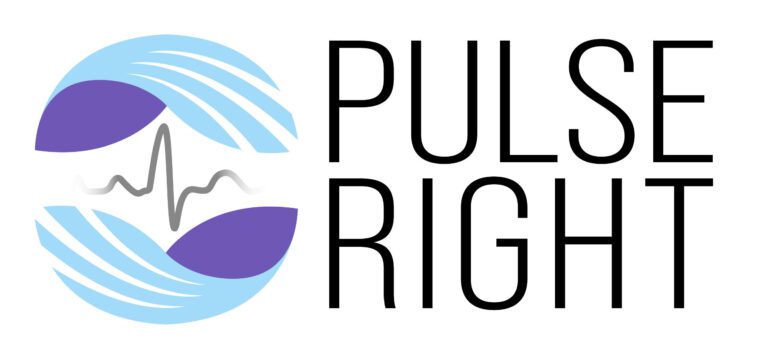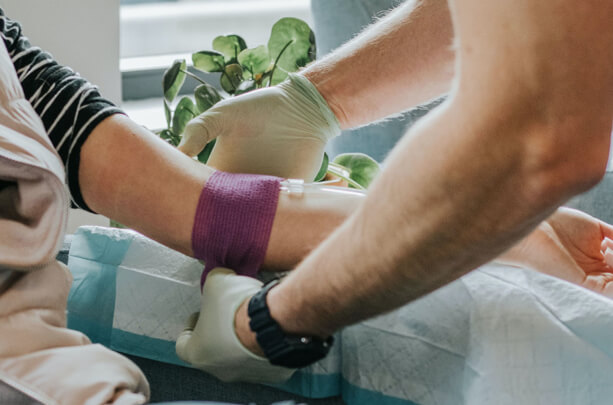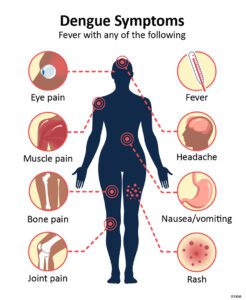Dengue is a viral infection caused by the dengue virus, which is primarily transmitted to humans through the bites of infected Aedes mosquitoes, particularly Aedes aegypti. This mosquito is commonly found in tropical and subtropical regions around the world. Dengue infection can lead to a wide range of symptoms, from mild fever to more severe and potentially life-threatening conditions.
The dengue virus belongs to the Flaviviridae family and has four distinct serotypes: DEN-1, DEN-2, DEN-3, and DEN-4. Once a person is infected with one serotype, they gain lifelong immunity to that specific serotype but remain susceptible to infection by the other serotypes. In some cases, a subsequent infection with a different serotype can lead to more severe symptoms due to a phenomenon called antibody-dependent enhancement (ADE).
Symptoms
The symptoms of dengue can vary from mild to severe, and in some cases, it can develop into a more serious condition known as dengue hemorrhagic fever or dengue shock syndrome.
It’s important to note that these symptoms can be similar to those of other viral illnesses, such as the flu. However, in some cases, dengue fever can progress to more severe forms, such as dengue hemorrhagic fever (DHF) and dengue shock syndrome (DSS).
Severe Symptoms
- Severe Abdominal Pain: Intense abdominal pain or tenderness.
- Persistent Vomiting: Repeated vomiting.
- Bleeding: Severe bleeding, such as nosebleeds, gum bleeding, or internal bleeding.
- Fluid Accumulation: Accumulation of fluid in the abdomen and lungs, leading to difficulty breathing.
- Weak Pulse: Rapid and weak pulse.
- Cold, Clammy Skin: Cold and clammy skin, indicating shock.
- Dengue hemorrhagic fever and dengue shock syndrome are medical emergencies and require immediate medical attention.
If you or someone you know is experiencing symptoms consistent with dengue fever, it’s important to seek medical care. In areas where dengue is prevalent, early diagnosis and proper medical management are crucial for a favourable outcome. To prevent dengue, it’s important to take measures to reduce mosquito exposure, such as using mosquito repellents, wearing protective clothing, and eliminating mosquito breeding sites around your living area.
Prevention
Preventing dengue involves controlling mosquito populations and reducing mosquito-human contact. This can be done by eliminating mosquito breeding sites, using mosquito repellents, wearing protective clothing, and using bed nets. There is currently no specific antiviral treatment for dengue, so management primarily involves supportive care to alleviate symptoms and prevent complications.
It’s important to note that dengue is a significant public health concern in many parts of the world, particularly in regions with a tropical or subtropical climate. Traveler’s to these areas should take precautions to avoid mosquito bites and be aware of the symptoms of dengue in case they develop after returning from a trip.
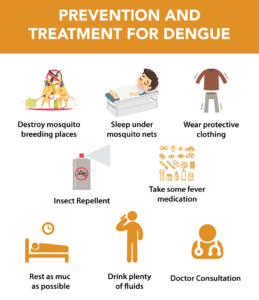
Dengue Vaccine
Why Singapore’s dengue fight differs from that in some countries?
Singapore’s application of Wolbachia technology to counter dengue sets it apart from neighbouring countries like Malaysia, Vietnam, and Indonesia. On the contrary, approximately twelve nations are adopting an alternative strategy known as the replacement approach. This technique involves releasing male and female mosquitoes carrying Wolbachia to breed with wild mosquitoes, resulting in the proliferation of offspring that carry Wolbachia.
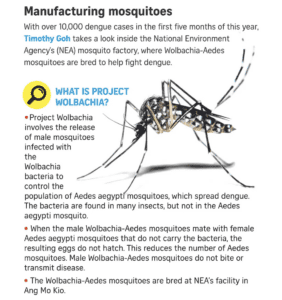
Treatment
Management of dengue primarily focuses on alleviating symptoms, preventing complications, and providing supportive care, as there is no specific antiviral treatment for the dengue virus. Here are key aspects of dengue treatment:
- Hydration: Adequate fluid intake is crucial, especially if the patient is experiencing fever, vomiting, and diarrhoea . Oral rehydration solutions or intravenous (IV) fluids may be used to prevent dehydration.
- Pain and Fever Relief: Over-the-counter pain relievers like acetaminophen (paracetamol) are commonly used to reduce fever and relieve pain. Avoid aspirin and non-steroidal anti-inflammatory drugs (NSAIDs) due to the risk of bleeding.
- Rest: Adequate rest helps the body recover from the infection.
- Monitoring: Regular monitoring of vital signs, such as temperature, blood pressure, and heart rate, is crucial to detect any deterioration.
- Medical Supervision: Patients should be under medical care, particularly if symptoms worsen or warning signs of severe dengue emerge.
- Platelet Transfusions: In severe cases with low platelet counts (thrombocytopenia) and bleeding, platelet transfusions might be considered.
- Avoiding Aspirin and NSAIDs: Aspirin and NSAIDs should be avoided to reduce the risk of bleeding.
- Seeking Medical Attention: Promptly seek medical help if dengue is suspected or symptoms worsen. This is crucial for severe symptoms like persistent vomiting, severe abdominal pain, bleeding, or difficulty breathing.
- Hospitalisation for Severe Cases: Severe dengue (dengue hemorrhagic fever or dengue shock syndrome) often requires hospitalisation for intensive monitoring and management.
- Preventing Mosquito Bites: While not a treatment, preventing further mosquito bites is vital to prevent reinfection and to halt virus transmission.
- Please remember that professional medical advice should be sought, and self-medication avoided.
References
- https://www.cdc.gov/dengue/index.html
- https://www.pathkindlabs.com/blog/dengue-fever-causes-symptoms-and-prevention-strategies
- https://www.indiatoday.in/india/story/dengue-cases-on-rise-in-karnataka-after-state-hit-by-heavy-rains-2415111-2023-08-02
- https://www.cdc.gov/dengue/symptoms/index.html
- https://www.straitstimes.com/singapore/health/one-bacterium-two-methods-why-spore-uses-suppression-approach-in-fighting-dengue-with-wolbachia#:~:text=But%20Singapore’s%20use%20of%20Wolbachia,Wolbachia%20bacterium%20at%20selected%20sites.
